英语语法—祈使句
- 格式:pptx
- 大小:3.42 MB
- 文档页数:21
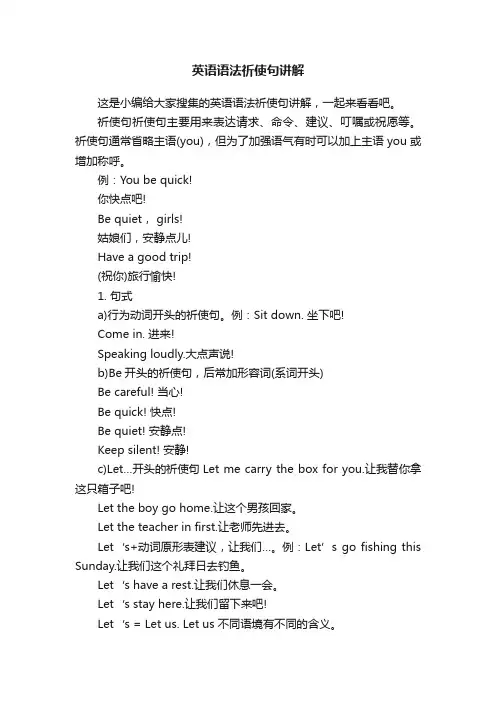
英语语法祈使句讲解这是小编给大家搜集的英语语法祈使句讲解,一起来看看吧。
祈使句祈使句主要用来表达请求、命令、建议、叮嘱或祝愿等。
祈使句通常省略主语(you),但为了加强语气有时可以加上主语you或增加称呼。
例:You be quick!你快点吧!Be quiet, girls!姑娘们,安静点儿!Have a good trip!(祝你)旅行愉快!1. 句式a)行为动词开头的祈使句。
例:Sit down. 坐下吧!Come in. 进来!Speaking loudly.大点声说!b)Be开头的祈使句,后常加形容词(系词开头)Be careful! 当心!Be quick! 快点!Be quiet! 安静点!Keep silent! 安静!c)Let…开头的祈使句Let me carry the box for you.让我替你拿这只箱子吧!Let the boy go home.让这个男孩回家。
Let the teacher in first.让老师先进去。
Let‘s+动词原形表建议,让我们…。
例:Let’s go fishing this Sunday.让我们这个礼拜日去钓鱼。
Let‘s have a rest.让我们休息一会。
Let‘s stay here.让我们留下来吧!Let‘s = Let us. Let us 不同语境有不同的含义。
Let‘s “请让我们(咱们…),包括谈话的对方。
”例:Let’s go out and play football.咱们出去踢足球吧!Let‘s have a rest!咱们休息一会吧!Let us 意为“请让我们……”表示希望得到对方允许,不包括对方。
Let us buy you a drink.给你买杯饮料吧!Let us go. (Don‘t stop us going.)请让我们走吧!2. 祈使句的否定式,在句首加don‘t,常用缩略式。
例:Don’t be late for school.上学别迟到。
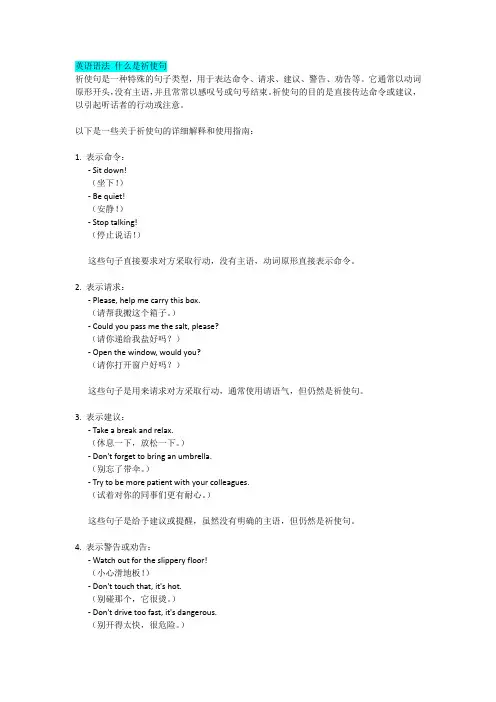
英语语法什么是祈使句祈使句是一种特殊的句子类型,用于表达命令、请求、建议、警告、劝告等。
它通常以动词原形开头,没有主语,并且常常以感叹号或句号结束。
祈使句的目的是直接传达命令或建议,以引起听话者的行动或注意。
以下是一些关于祈使句的详细解释和使用指南:1. 表示命令:- Sit down!(坐下!)- Be quiet!(安静!)- Stop talking!(停止说话!)这些句子直接要求对方采取行动,没有主语,动词原形直接表示命令。
2. 表示请求:- Please, help me carry this box.(请帮我搬这个箱子。
)- Could you pass me the salt, please?(请你递给我盐好吗?)- Open the window, would you?(请你打开窗户好吗?)这些句子是用来请求对方采取行动,通常使用请语气,但仍然是祈使句。
3. 表示建议:- Take a break and relax.(休息一下,放松一下。
)- Don't forget to bring an umbrella.(别忘了带伞。
)- Try to be more patient with your colleagues.(试着对你的同事们更有耐心。
)这些句子是给予建议或提醒,虽然没有明确的主语,但仍然是祈使句。
4. 表示警告或劝告:- Watch out for the slippery floor!(小心滑地板!)- Don't touch that, it's hot.(别碰那个,它很烫。
)- Don't drive too fast, it's dangerous.(别开得太快,很危险。
)这些句子是用来警告或劝告对方避免潜在的危险或错误。
祈使句的特点是直接、简洁和命令性。
它不包括任何主语,主要依靠动词原形来传达指令。
此外,祈使句通常用于口语和非正式的书面语境中,以更直接、简洁和有效地与对方沟通。
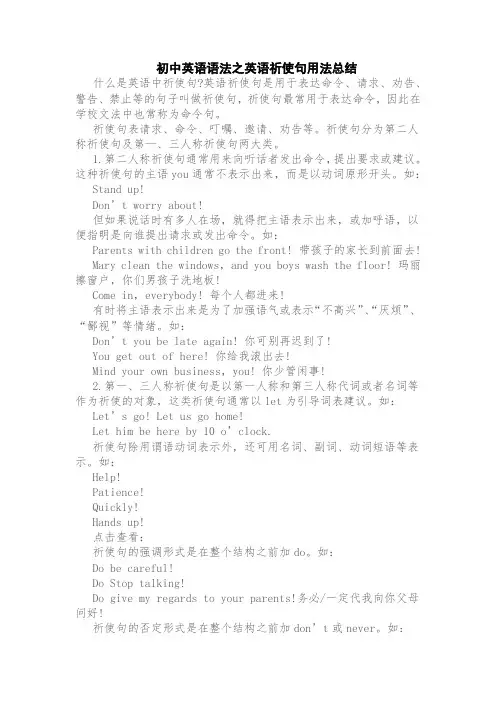
初中英语语法之英语祈使句用法总结什么是英语中祈使句?英语祈使句是用于表达命令、请求、劝告、警告、禁止等的句子叫做祈使句,祈使句最常用于表达命令,因此在学校文法中也常称为命令句。
祈使句表请求、命令、叮嘱、邀请、劝告等。
祈使句分为第二人称祈使句及第—、三人称祈使句两大类。
1.第二人称祈使句通常用来向听话者发出命令,提出要求或建议。
这种祈使句的主语you通常不表示出来,而是以动词原形开头。
如:Stand up!Don’t worry about!但如果说话时有多人在场,就得把主语表示出来,或加呼语,以便指明是向谁提出请求或发出命令。
如:Parents with children go the front! 带孩子的家长到前面去!Mary clean the windows,and you boys wash the floor! 玛丽擦窗户,你们男孩子洗地板!Come in,everybody! 每个人都进来!有时将主语表示出来是为了加强语气或表示“不高兴”、“厌烦”、“鄙视”等情绪。
如:Don’t you be late again! 你可别再迟到了!You get out of here! 你给我滚出去!Mind your own business,you! 你少管闲事!2.第一、三人称祈使句是以第一人称和第三人称代词或者名词等作为祈使的对象,这类祈使句通常以let为引导词表建议。
如:Let’s go! Let us go home!Let him be here by 10 o’clock.祈使句除用谓语动词表示外,还可用名词、副词、动词短语等表示。
如:Help!Patience!Quickly!Hands up!点击查看:祈使句的强调形式是在整个结构之前加do。
如:Do be careful!Do Stop talking!Do give my regards to your parents!务必/一定代我向你父母问好!祈使句的否定形式是在整个结构之前加don’t或never。
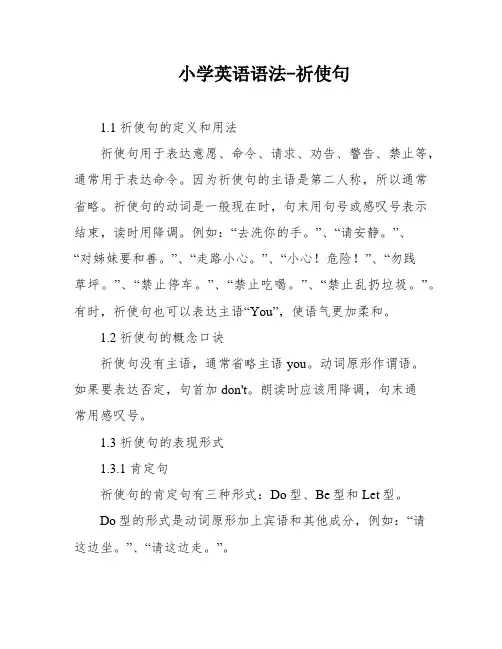
小学英语语法-祈使句1.1 祈使句的定义和用法祈使句用于表达意愿、命令、请求、劝告、警告、禁止等,通常用于表达命令。
因为祈使句的主语是第二人称,所以通常省略。
祈使句的动词是一般现在时,句末用句号或感叹号表示结束,读时用降调。
例如:“去洗你的手。
”、“请安静。
”、“对姊妹要和善。
”、“走路小心。
”、“小心!危险!”、“勿践草坪。
”、“禁止停车。
”、“禁止吃喝。
”、“禁止乱扔垃圾。
”。
有时,祈使句也可以表达主语“You”,使语气更加柔和。
1.2 祈使句的概念口诀祈使句没有主语,通常省略主语you。
动词原形作谓语。
如果要表达否定,句首加don't。
朗读时应该用降调,句末通常用感叹号。
1.3 祈使句的表现形式1.3.1 肯定句祈使句的肯定句有三种形式:Do型、Be型和Let型。
Do型的形式是动词原形加上宾语和其他成分,例如:“请这边坐。
”、“请这边走。
”。
Be型的形式是Be加上名词或形容词和其他成分,例如:“要做一个好孩子!”。
Let型的形式是Let加上宾语、动词原形和其他成分,例如:“让我来帮你。
”。
1.3.2 否定句祈使句的否定句可以使用Do型和Be型,都是在句首加上don't,例如:“不要忘记我!”、“上学不要迟到!”。
如果是系表结构,只能使用Don't。
2.There are two types of negative sentences in the let form: "Don't + let + object + verb base form + other elements" and "Let + object + not + verb base form + other elements"。
For example: Don't let him go。
/ Let him not go。
Don't let him leave.3.Some imperative sentences can start with "no" to XXX: No smoking。
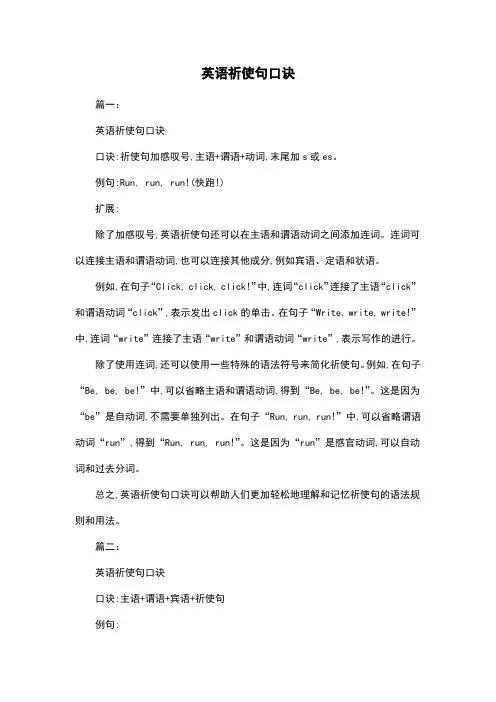
英语祈使句口诀篇一:英语祈使句口诀口诀:祈使句加感叹号,主语+谓语+动词,末尾加s或es。
例句:Run, run, run!(快跑!)扩展:除了加感叹号,英语祈使句还可以在主语和谓语动词之间添加连词。
连词可以连接主语和谓语动词,也可以连接其他成分,例如宾语、定语和状语。
例如,在句子“Click, click, click!”中,连词“click”连接了主语“click”和谓语动词“click”,表示发出click的单击。
在句子“Write, write, write!”中,连词“write”连接了主语“write”和谓语动词“write”,表示写作的进行。
除了使用连词,还可以使用一些特殊的语法符号来简化祈使句。
例如,在句子“Be, be, be!”中,可以省略主语和谓语动词,得到“Be, be, be!”。
这是因为“be”是自动词,不需要单独列出。
在句子“Run, run, run!”中,可以省略谓语动词“run”,得到“Run, run, run!”。
这是因为“run”是感官动词,可以自动词和过去分词。
总之,英语祈使句口诀可以帮助人们更加轻松地理解和记忆祈使句的语法规则和用法。
篇二:英语祈使句口诀口诀:主语+谓语+宾语+祈使句例句:- Run, run, run!(跑步,快跑!)- Open, open, open!(打开,打开!)- Look, look, look!(看,看!)- Yes, no, no!(是,否,否!)-动词+副词+过去式/过去分词+主语+谓语+宾语+祈使句拓展:1. 主语 + 谓语 + 宾语 + 祈使句这句话可以表示一个简单的命令或请求。
例如,“Run, run, run!”这句话可以表示快速奔跑,类似于汉语中的“跑!”。
2. 动词 + 副词 + 过去式/过去分词 + 主语 + 谓语 + 宾语 + 祈使句这句话可以表示一个动词的过去式或过去分词,加上主语、谓语和宾语,然后加上祈使句。
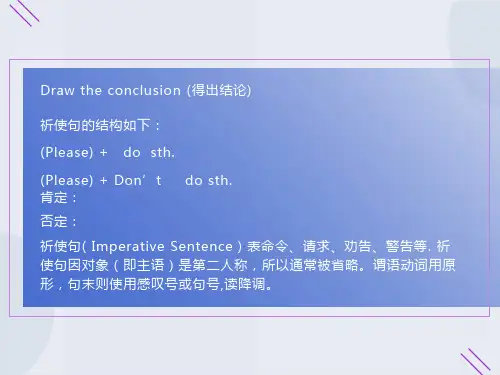
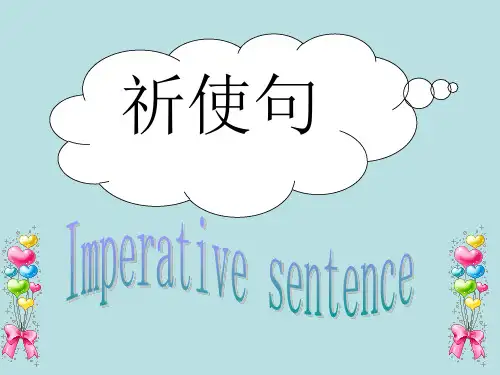
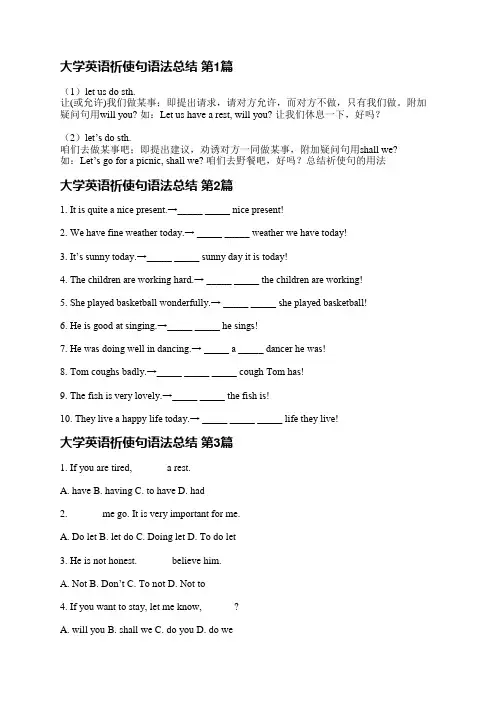
大学英语祈使句语法总结第1篇(1)let us do sth.让(或允许)我们做某事;即提出请求,请对方允许,而对方不做,只有我们做。
附加疑问句用will you? 如:Let us have a rest, will you? 让我们休息一下,好吗?(2)let’s do sth.咱们去做某事吧;即提出建议,劝诱对方一同做某事,附加疑问句用shall we?如:Let’s go for a picnic, shall we? 咱们去野餐吧,好吗?总结祈使句的用法大学英语祈使句语法总结第2篇1. It is quite a nice present.→_____ _____ nice present!2. We have fine weather today.→ _____ _____ weather we have today!3. It’s sunny today.→_____ _____ sunny day it is today!4. The children are working hard.→ _____ _____ the children are working!5. She played basketball wonderfully.→ _____ _____ she played basketball!6. He is good at singing.→_____ _____ he sings!7. He was doing well in dancing.→ _____ a _____ dancer he was!8. Tom coughs badly.→_____ _____ _____ cough Tom has!9. The fish is v ery lovely.→_____ _____ the fish is!10. They live a happy life today.→ _____ _____ _____ life they live!大学英语祈使句语法总结第3篇1. If you are tired, ______ a rest.A. haveB. havingC. to haveD. had2. ______ me go. It is very important for me.A. Do letB. let doC. Doing letD. To do let3. He is not honest. ______ believe him.A. NotB. Don’tC. To notD. Not to4. If you want to stay, let me know, ______?A. will youB. shall weC. do youD. do we5. Never come late again, ______?A. will youB. won’tC. do youD. does he6. _____ up early tomorrow, or you can’t catch the train.A. GettingB. GetC. To getD. Got7. _____ in the street. It’s dangerous.A. Not playB. Not to playC. Don’t playD. Don’t to play8. Please ______ me some money, will you?A. lendB. lendingC. to lendD. be lend9. The film is about to begin. Please ______ seated.A. beB. areC. isD. being10. _____ the boxes. You may use them later.A. KeepB. KeepingC. To keepD. Kept大学英语祈使句语法总结第4篇11. Would you like to wait a moment?→_____ _____ a moment.12. Can I use your bike?→Please _____ _____ your bike.13. You’d better not smoke here.→_____ _____ here.14. You must be careful with your handwriting. _____ _____ with your handwriting.15. Will you please not play with my pencil? →____ ____ with my pencil,____.。
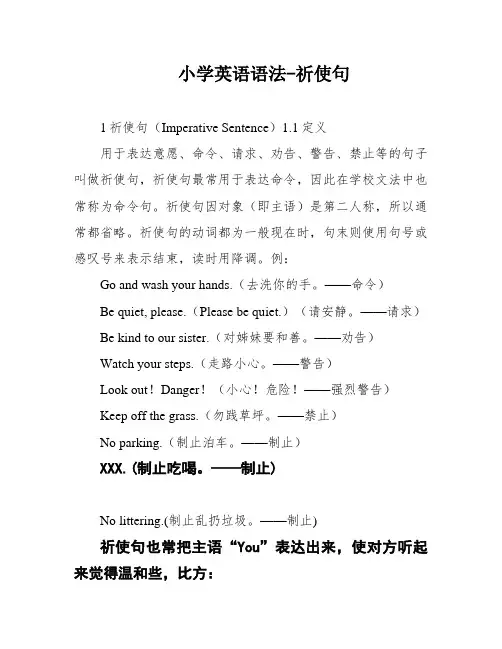
小学英语语法-祈使句1祈使句(Imperative Sentence)1.1定义用于表达意愿、命令、请求、劝告、警告、禁止等的句子叫做祈使句,祈使句最常用于表达命令,因此在学校文法中也常称为命令句。
祈使句因对象(即主语)是第二人称,所以通常都省略。
祈使句的动词都为一般现在时,句末则使用句号或感叹号来表示结束,读时用降调。
例:Go and wash your hands.(去洗你的手。
——命令)Be quiet, please.(Please be quiet.)(请安静。
——请求)Be kind to our sister.(对姊妹要和善。
——劝告)Watch your steps.(走路小心。
——警告)Look out!Danger!(小心!危险!——强烈警告)Keep off the grass.(勿践草坪。
——禁止)No parking.(制止泊车。
——制止)XXX.(制止吃喝。
——制止)No littering.(制止乱扔垃圾。
——制止)祈使句也常把主语“You”表达出来,使对方听起来觉得温和些,比方:You go and tell him, Chris.(XXX去告诉他。
)1.2观点口诀祈使句无主语,主语you常省去;动词真相谓语当,句首加don't变否定;朗读应当用降调,句末常标感叹号。
1.3表现形式1.3.1肯定句1.Do型(即:动词原形(+宾语)+其它成分)。
如:Please have a seat here.请这边坐。
有的祈使句在意义明确的情况下,动词可省略。
如:This way, please. = Go this way,XXX.请这边走。
2.Be型(即:Be +表语(名词或形容词)+其它成分)。
如:Be a good boy!要做一个好孩子!3.Let型(即:Let +宾语+动词真相+别的成分)。
如:Let me help you.让我来帮你。
1.3.2否定句1.Do型和Be型的否定式都是在句首加don't构成:如:Don'tforgetme!不要忘记我!Don't be XXX!上学不要迟到!是系表结构——也就是没有行为动词但是有形容词的那种——使用Don't be有行动动词的就不能这么用,只能用Don't2.Let型的否定式有两种:“Don't + let +宾语+动词真相+别的成分”和“Let +宾语+ not +动词真相+别的成分”。
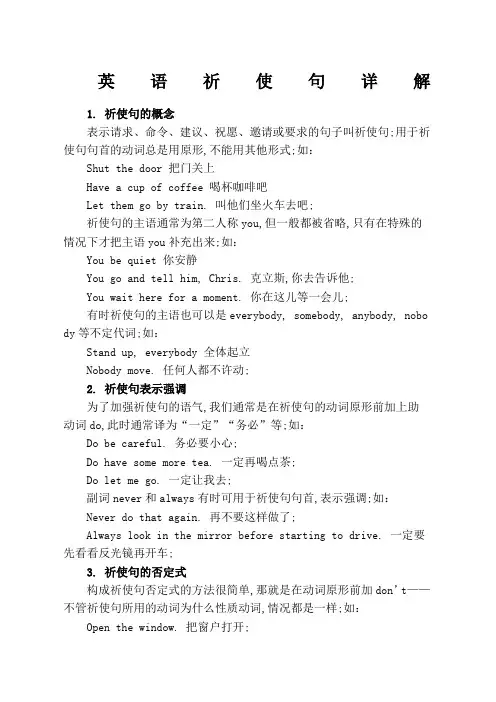
英语祈使句详解1. 祈使句的概念表示请求、命令、建议、祝愿、邀请或要求的句子叫祈使句;用于祈使句句首的动词总是用原形,不能用其他形式;如:Shut the door 把门关上Have a cup of coffee 喝杯咖啡吧Let them go by train. 叫他们坐火车去吧;祈使句的主语通常为第二人称you,但一般都被省略,只有在特殊的情况下才把主语you补充出来;如:You be quiet 你安静You go and tell him, Chris. 克立斯,你去告诉他;You wait here for a moment. 你在这儿等一会儿;有时祈使句的主语也可以是everybody, somebody, anybody, nobo dy等不定代词;如:Stand up, everybody 全体起立Nobody move. 任何人都不许动;2. 祈使句表示强调为了加强祈使句的语气,我们通常是在祈使句的动词原形前加上助动词do,此时通常译为“一定”“务必”等;如:Do be careful. 务必要小心;Do have some more tea. 一定再喝点茶;Do let me go. 一定让我去;副词never和always有时可用于祈使句句首,表示强调;如:Never do that again. 再不要这样做了;Always look in the mirror before starting to drive. 一定要先看看反光镜再开车;3. 祈使句的否定式构成祈使句否定式的方法很简单,那就是在动词原形前加don’t——不管祈使句所用的动词为什么性质动词,情况都是一样;如:Open the window. 把窗户打开;→Don’t open the window. 别把窗户打开;Come next Monday. 下周星期一来;→Don’t come next Monday. 下周星期一别来;对于以let us或let’s开头的祈使句,其否定式通常是在不定式之前放一个not;如:Let’s tell him the truth. 我们把实情告诉他吧;→Let’s not tell him the truth. 我们不要把实情告诉他;但在日常口语中,我们也可以把don’t放在let’s之前;如:Let’s don’t te ll him the truth. 我们不要把实情告诉他4. 祈使句与连用please为了使祈使句的语气变得委婉,我们可以在祈使句的句首或句末加上please——若加在句首,其后不用逗号;若加在句末,则通常会在plea se前加一个逗号;如:Step this way, please. 请这边走;Please type your letter. 请把你的信打出来;Open the window, please. 请把窗户打开;如果是否定祈使句,则通常将please加在don’t之前;如:Plea se don’t get angry. 请不要生气;Please don’t telephone before 8 a. m. 早8点以前请不要打电话;5. 祈使句的时间概念祈使句所表示的时间总是指将来,所以与它连用的句子原则上要用将来时态来与它呼应;如:Give me a hand, will you 帮我一个忙,好吗由于give me a hand表示隐含将来意义,所以句中的will you 不能改为do you;Try again and you will succeed. 你再试就会成功;由于句中的try again隐含将来意义,所以句中用了you will succ eed,而不是you succeed;Don’t do that again or you’ll be in trouble. 别再干那个了,否则你会有麻烦;句中的don’t do that again指的是以后不要再干那事了,由于隐含有将来意义,所所以句中用了you’ll be in trouble,而没有用you a re in trouble;6. 祈使句的省略一般说来,祈使句总是要以动词原形开头,但是,在某些特殊情况下,我们可以只用一个词或短语来表示祈使句的意义;如:Just a few please. 请给几个就行了;A little more slowly please. 再慢一点;A pound of butter. 给我一磅黄油;Two teas and four coffees, please. 请来两杯茶和四杯咖啡;助动词 do 在祈使句中的强调用法有时可在祈使句前加上助动词do 常重读,以表示说话人想特别强调他所说的话;这样用的祈使句具有以下用法:1. 表示强调的请求;如:Do come with us. 请一定要和我们一起去;Please Do be quiet a moment 求求你们安静一会儿2. 表示委婉或客气;如:Do try this fish. 请尝尝这鱼;Do have another cup of coffee. 请再喝杯咖啡吧;3. 表示不耐烦;如:Do stop talking 别说啦4. 希望说服对方;如:Do help me with this maths problem. 务请帮我解答这道数学题;someone和nobody等用作祈使句主语有时因为语义的需要,someone, nobody, everybody 等也可用作祈使句主语;如:Nobody say a word 都不许说话Someone fetch a pail of water. 谁去打一桶水来;Someone go and see who it is. 谁去看看是什么人来了;Somebody answer the phone please. 请来个人接电话;Everybody sit down and let’s have a drink. 大家坐下来喝一杯吧有时用作祈使句主语的还可以特定的某人;如:The boy in the corner come here. 在角落的那个男孩来这里吧这类句子有时也可以是否定的;如:Don’t anybody get out of here. 大家都别出去祈使句何时可以保留主语you祈使句的主语通常为第二人称you,但一般都被省略的;但以下两种情况可以保留主语you:第1情况为了有所区分,祈使句可以保留主语 you;如:You go on; I’ll wait. 你们先走,我等着;You wait here for a moment. 你在这儿等一会儿;You girls stand in the front row. 你们女孩子站在前排;You play Romeo and you play Juliet. 你演罗蜜欧,你演朱丽叶;You wait here, Jim, and Mary, you wait there. 你等在这儿,吉姆;玛丽,你等在那儿;第2种情况为了表示生气或有意表示无礼,祈使句可以保留主语 you;如:You be quiet 你给我安静You stop talking. 你给住嘴;You get out of here 你给我滚出去;You do it right away. 你给我马上就去做;let us 与let’slet us 的 us 既可指说话者一方此时表示请求或命令,也可以指说话者和听话者双方此时表示建议或劝诱,此用法在语体上较正式;而let’s 中的’s=us 则只能指说话者和听话者双方表示建议或劝诱,不能指说话者一方即不能用来表示命令或请求;比较:让我们告诉你我们在博物馆里看到的情况;误:Let’s tell you what we saw in the museum.正:Let us tell you what we saw in the museum.我们做朋友吧;正:Let’s be friends.较口语化正:Let us be friends.较正式在反意问句中,表示请求或命令时,用 will you;表示建议或劝诱时,用 shall we;如:我们一起去游泳好吗正:Let’s go swimming together, shall we 较口语化正:Let us go swimming together, shall we 较正式让我们跟你一起去好吗正:Let us go with you, will you误:Let’s go with you, will you shall welet’s 的否定式可以是let’s not, don’t let’s;如:Let’s not hurry. / Don’t let’s hurry. 我们不要太急;祈使句的动词可以是被动的吗有时可以,但比较少见;如:Don’t be fooled by his appearance. 不要为他的外表所欺骗了;Don’t be taken in by his promises. 别被他的诺言所欺骗;Don’t be stampeded into buying the house. 不要一时冲动买下这所房子;有时don’t 后接的“be+过去分词”不是被动式,而是系表结构;如:Don’t be discouraged. 不要气馁;祈使句备考注意1.祈使句主要用于提出请求,发出邀请,给予指示、忠告或警告,也可发出命令等;2.祈使句的特点是:一般不出现主语you,但有时为了指明向谁请求或命令,也可以说出主语;谓语动词一律用原形;否定式一律在动词前面加don’t;如:Come this way, madam. 这边走,夫人;Don’t lose the key. 别把钥匙丢了;Someone fetch a pail of water. 谁去打一桶水来;3.有关祈使句最可能涉及的考点是:祈使句带主语以及“祈使句+and / then / or+陈述句”这一句型祈使句表示条件;另外,祈使句与反意疑问句一起考查也是高考一大特点;如:Let’s phone her now, shall we 我们现在就给她打电话,好吗You girls stand in the front row, will you 你们女孩子站在前排,好吗Work hard, and you’ll pass the exam. 努力点,你会通过考试的;请做以下试题:1 Jim, you go there to help him, _______A. do youB. will youC. are youD. have you答案选B;句首的呼语 Jim 清楚地表明这一个祈使句,只是其前带了主语而已;2 ________ me back my money, or I’ll ring the police.A. GivingB. GivenC. GiveD. To give答案选C;填空处为祈使句谓语,故用动词原形;学习祈使句的几个基本要点一、祈使句的概念和一般形式表示请求、命令等的句子叫祈使句;它的主语是听话人you ,一般不需要说出来;通常以动词原形开头;祈使句末尾用惊叹号或句号,句子用降调;如:Open the door, please. 请把门打开;Be quiet, boys. 孩子们,安静点;Hurry up快点跟上;但有时为了指明向谁请求或发出命袋子令,也可说出主语来;如:Alice, you close your book. 艾丽期,请你把书关上;二、祈使句的否定式祈使句的否定式是在动词原形前加don’t;如:Don’t be late again. 不要再迟到了;Please don’t forget to take your medicine. 请不要忘记吃药;Don’t let’s quarrel about it. =Let’s not quarrel about it.我们不要为此事争吵了;三、祈使句的强调式Do be on time. 务必准时;Do come early. 务必早点来;四、区分let’s与let us /sb.Please let him in. 请让他进去;—Let’s go swimming, shall we我们去游泳,好吗—No, let’s not. /Yes, let’s. 不要去了;/我们去吧;—Let us go swimming, will you请你让我们去游泳,好吗—No, you’d better not. 你们最好别去;不要混淆祈使句与非谓语动词有这样一道语法考题,该用动词原形还是用非谓语动词_________ the road round to the right and you’ll find his h ouse.A. FollowB. FollowingC. To followD. Followed分析此题容易误选B或C,许多同学一看选项就想当然地认为,选现在分词表示时间或伴随,选不定式表目的;此题的关键是要注意句中的连词an d,它表明整个句子是一个并列句,即 and 前后应各是一个独立的句子,而不应是一个非谓语形式的短语,所以此题的正确答案应选A,即 and 前是一个祈使句;比较以下两题:1 _________ the road round to the right, she found his house.A. FollowB. FollowingC. To followD. Followed分析此题应选B,现在分词短语表时间;2 _________ the road round to the right, the blind man askeda boy to guide him.A. FollowB. FollowingC. To followD. Followed分析此题应选C,不定式短语表目的;注意以下各题均应选A,均因为句中的并列连词 and填空句为祈使句:1 _________ the milk and set a good example to the other chi ldren.A. DrinkB. To drinkC. DrinkingD. Having drinking2_________ me, and don’t just stand there laughing.A. AnswerB. To answerC. AnsweringD. To be answering3 _________ me , and then try to copy what I do.A. WatchB. WatchingC. To watchD. Have watching4 _________ through this book and tell me what you think of it.A. LookB. LookingC. To lookD. Having looked5_________ it with me and I’ll see what I can do.A. LeaveB. LeavingC. If you leaveD. When left注:有时可能不用连词,而用破折号答案均选B,填空句为祈使句;如:1 _________ down the radio —the baby’s asleep in the next room.A. TurningB. TurnC. TurnedD. To turn2 _________ some of this juice — perhaps you will like it.A. TryingB. TryC. To tryD. Having tried以下各题也应选A,是因为句中的从属连词 when, before, until 等填空句为祈使句:1 _________ left when you get to the end of the street.A. KeepB. KeepingC. To keepD. Kept2 _________ you hand over your mouth when you cough.A. PutB. PuttingC. To putD. To be putting3 _________ him enough time to get home before you telephone.A. GiveB. To giveC. GivingD. Given4_________ until the lights have turned to green.A. WaitB. To waitC. WaitingD. Having waited5 _________ the pieces of cloth with a loose stitch before f inally sewing them together.A. JoinB. To joinC. JoiningD. Joined以下各题也应选A,即填空句为祈使句:1Don’t give me a long account, just _________ the plain fa cts.A. tellB. tellingC. to tellD. to be telling2 First _________ the rice by washing it, then _________ it in boiling water.A. prepare, cookB. preparing, cookingC. prepa ring, cookD. prepare, cooking3Don’t sit there watching — _________ and help meA. comeB. comingC. to comeD. to be coming4Don’t waste your money on silly things — _________ it.A. saveB. to saveC. savingD. having saved5 To test eggs, _________ them in a bowl of water: if they f loat they’re bad, if they sink they’re good.A. putB. puttingC. to putD. to be putting但是,以下各题情形有所不同,所填部分为目的状语用不定式,即答案均为B:1 _________ late in the morning, Bob turned off the alarm.A. SleepB. To sleepC. SleepingD. Having slept2 _________ the early bus, Mr Smith got up at six.A. CatchB. To catchC. CatchingD. Having caught用复合不定代词作主语的祈使句■当要对一群人讲话时,祈使语气可与everybody, someone之类的词连用;如:Nobody move. 谁都别动;Nobody say a word 都不许说话Someone fetch a pail of water. 谁去打一桶水来;Somebody answer the phone please. 请来个人接电话;Someone go and see who it is. 谁去看看是什么人来了;Don’t anybody get out of here. 大家都别出去Everyone keep quiet 大家安静Everybody sit down and let’s have a drink. 大家坐下来喝一杯吧Mary, come here — everybody else stay where you are. 玛丽到这里来,其他人都留在原地;■在表示否定的命令语气后面可用带any的复合词:Don’t say a word anybody 谁都不要说话Don’t anybody say a word 任何人都不许说话以let开头的祈使句用法归纳■let后接第一人称Let’s have a look. 让我看一下;Let’s take a taxi 让我们坐出租车吧Let’s give you a hand. 让我帮助你;Let’s paint it ourselves. 我们自己来刷漆;Let’s take a taxi, shall we 我们坐出租车好吗Let’s start now and work till dark. 让我们现在开始工作一直到天黑;Let’s go shopping now. The shops will be / should be fairly empty. 我们去商店买东西吧;商店里人不会太多;Let me fix you a drink. 我给你去弄点饮料;Let me have a try. 我来试一试;Let me show you how to do it. 我来告诉你怎样做;Let me pay for myself. 让我自己来付我的那份钱;Let me have another cup of tea. 给我再来一杯茶;Let me know if you should hear some more news. 万一你听到更多消息你要通知我;■let后接第二人称较少见Let you and I try to make this all right. 让你和我试试把这个做好;■let后接第三人称Let her do what she likes. 让她做她想做的事吧;Let the meat cook slowly. 把肉用慢火炖;Let XYZ be a triangle. 设XYZ为一个三角形;Let the two lines be parallel. 假设两条线是平行的;Let every man do his best. 让每个人人尽其才;Let him have his own way. 让他照自己的意思做吧Let the true cause of the accident be published. 把造成这件意外的真正原因公开吧;Let h im try that game again on me, and I’ll soon put paid t o it. 他如若再和我玩这把戏,我很快就会叫他收起来;■let后接there be句式“Let there be no reprisals,” said the widow of the murdere d man. 被害者的遗孀说:“千万不要搞复仇;”Let there be light. 让地上有光;Let there be no doubt in your minds about our intentions. 对于我们的意图,你们心里不要有疑问;祈使句用法详解:表厌烦或为耐烦■典型例句Do be quiet. 安静点儿吧Stop probing 不要盘根问底了Speak quietly, can’t you 说话沉稳些,行不行Stop fiddling with that TV, will you 别摆弄那台电视机了,行不行祈使句用法详解:表警告或威胁■典型例句Don’t be rude. 不要无礼;Don’t you speak to me like that 你别这样跟我讲话Stir, and you are a dead man. 动一下就要你的命;Never speak to me like that again. 决不要再那个样子跟我说话;Put that down, or else I’ll smack you. 把它放下来,不然我会揍你;Do that again and I’ll call a policeman. 你再这样做我就要叫警察了;Fail to pay and they’ll cut off the electricity. 你如果不付款,他们就要断电;祈使句用法详解:表粗暴■典型例句Shut up 住口Push off 走开Get out 滚出去Get out of here 滚开Go to hell 见鬼去吧You get out of here 你给我滚出去;You take your hands off me 把你的手给我拿开祈使句用法详解:表祝愿■典型例句Have fun 愿你玩得快活Have a good time 祝你玩得开心Have a good day 祝你度过美好的一天Have a really good meal 愿你享受一顿美餐Have a lovely party 愿你有一次愉快的聚会Have a really restful holiday 愿你度过一次十分悠闲的休假Have a really interesting debate 愿你们有一次十分有趣的辩论祈使句用法详解:表邀请■典型例句Have a cup of coffee 喝杯咖啡吧Mary, play on my side. 玛丽,你和我一伙玩吧;Come and have dinner with us soon. 一会儿来跟我们一起吃饭吧;Go on Have another slice Be a devil 继续吃呀再来一片放开吃祈使句用法详解:表禁止■典型例句Keep off the grass 请勿践踏草地Do not touch these wires. 请勿接触电线Do not feed the animals 不许给动物扔食物Do not feed the lions. 请勿向狮子投喂食物祈使句用法详解:表指引■典型例句Walk to the corner, turn right and cross the road. 走到那个拐角,然后向右拐穿过马路;Go straight on and you’ll see a church. 径直往前走,你会看到一座教堂;Take the 2nd turning on the left and then turn right. 在第二个拐角处向左,然后再向右拐;祈使句用法详解:表告诫■典型例句Beware of the dog 当心狗Beware of pickpockets. 小心扒手;Look out Mind your head 小心当心头Take care not to catch cold. 小心别着凉;Look out There’s a bus 当心有公共汽车Always keeps to your promise. 一定要遵守诺言;Remember to switch off all the lights. 记着把所有的灯关掉;Do not use this spray neat a naked flame. 别在火焰附近使用这种喷射剂;Always look in the mirror before starting to drive. 一定要先看看反光镜再开车;Be there on time otherwise you’ll create a bad impression 要准时来,否则你会给人一个坏的印象;有不少否定的祈使句用于表示告诫:Don’t panic 别慌fromDon’t lose the key. 别把钥匙丢了;D on’t ever do that again. 别再这样做了;Don’t tell anybody, will you 不要告诉任何人,好吗尤其要注意一些以 Never 开头的祈使句;如:Never say die. 不要气馁Never speak to strangers 不要跟陌生人说话Never do that again. 再不要这样做了;Never ask her about her marriage. 决不要问她结婚的事;Never buy expensive clothes. 决不要买贵重的衣裳;Never touch an electric wire when it is broken. 绝不要动断了的电线;Never trouble trouble till trouble troubles you. 不要无事惹事;Never hold a gun by the business end. 拿枪千万别拿枪口那端;Never identity opinions with facts. 绝不要把意见和事实等同起来;Never put off till tomorrow what you can do today. 今日事,今日毕;Never leave a silk shirt to the tender mercies of an automat ic washing-machine. 切勿用自动洗衣机洗绸衬衫;Never pay the advertised price for a car; always try to barg ain. 千万不要照牌价购买汽车,总得讲讲价才是;祈使句用法详解:表叮嘱■典型例句Fasten your seat belt. 系好安全带;Be sure to get here before nine. 千万要在九点以前到;Stay in bed for a couple of days. 卧床休息几天;Take care of yourselves. 你们要注意身体啊Look over what you’ve written before handing it to the exam iner. 先把你写的看一遍,再交给考官;Cross the road very carefully. Look both ways, or you might be knocked down. 过马路要非常小心,要看两边,不然会被车撞倒;祈使句用法详解:表建议■典型例句Get your hair cut 你去理发吧Get your eyes tested 你去检查一下你的眼睛吧Ask Jake, not his wife. 去问杰克,不要问他妻子;Come early, but not before six. 早点来,但别在6点以前;Go off for the weekend, why don’t you 去度周末,好吗Have a bath and a rest and you’ll feel better. 洗个澡,休息一下,你就会觉得好些;Cancel the match if it rains. If it rains, cancel the match.如果下雨,就取消比赛吧;Take a taxi, otherwise you’ll miss your train. 你如不叫出租汽车,你就会误掉火车的;You try teaching 40 noisy children five days a week 你来试试每周5天教40个吵闹的孩子注:以let’s开头的祈使句通常表示建议;如:Let’s go to the cinema tonight. 今晚咱们去看电影;Let’s get down to work. 咱们干起来吧from ;祈使句用法详解:表请求■典型例句Give me a hand, will you 帮我一个忙,好吗Please help me for a few minutes. 请帮我几分钟;Please remember me to Mr. Smith. 请帮我向史密斯先生致意;Do forgive me I didn’t mean to be rude. 务请原谅,我无心对你粗鲁无礼;Be an angel and fetch me my slippers please. 请行行好,把我的拖鞋拿来;Please don’t telephone before 8 a. m. 早8点以前请不要打电话;Hand me the hammer, will you 把锤子递给我好吗Do be quiet, for God’s sake 看在上帝的份上,安静一会儿吧Give me some bread as well, please. 请你也给我一点儿面包吧;Bring the fruit up to the dining room, will you把水果送到楼上餐厅里来好吗I’ll try on a few of these shirts. Please pass me that whit e one. 我要试穿几件衬衣,请把那件白色的递给我from ;祈使句用法详解:表命令■典型例句Hands off 不要摸Go there right away. 马上去那儿;Nobody move. 任何人都不许动;Stand over there. 站到那边去;Drop that gun, or I’ll shoot you. 放下枪,不然我就打死你;如何引用祈使句祈使句如要引用,多使用一个不定式,前面的谓语形式根据语气决定;如:“Wake him up,” she said.→She told me to wake him up.“See a neurologist,” the doctor said.→The doctor advised me to see a neurologist.“Stay where you are and don’t move,” commanded the sergea nt.→The sergeant commanded the man to stay where he was and no t to move.“Carry the trunk upstairs,” Mr. Brown said.→Mr. Brown ordered the men to carry the trunk upstairs.■能跟这种结构的动词有:advise ask beg command fo rbid instruct invite orderpersuade remind teach tell urge warn没有动词的祈使句祈使句除用谓语动词表示外,还可用名词、形容词、副词等,如:Help 救人哟Fire 失火了Patience 要有耐心Careful 小心Quickly 快Hands up 举起手来Good heavens 天哪“be+过去分词”用于祈使句be可以和少数过去分词连用,用于祈使句当中;如:Be prepared 准备好Please be seated 请坐下Be warned 该小心了试比较:Get washed 去洗一洗注:祈使句偶尔也用进行式,即 be 后接现在分词;如:Be listening to this station at the same time tomorrow night.请于明晚同一时间听本台的广播;“be+形容词”用于祈使句只有表示一时的行为的形容词才可用于be / don’t be之后,如care ful / careless, patient / impatient, quiet, silly等be / don’t be通常不可与指状态的形容词连用,如hungry / thirsty, pretty;如:Be quiet 安静点Don’t be silly 不要发傻Do be patient. 一定要有耐心;Be careful about what you say. 说话要小心;Be more careful with your work. 你的工作要再细心一些;Be careful not to break anything. 当心别打破什么了;Be sure you don’t break any of them. 千万别把它们打破了;Be sure to write to ma as soon as you get there. 到了千万给我来信;Be sure and come as soon as possible. 一定要尽快来;Be sure to send out all the invitations today. 一定要在今天把请帖都发出去;注意有关的回答:Be quiet 别说话→否定的回答:I won’t 我不嘛Don’t be so impatient 别这么着急→否定的回答:I’m not 我不着急“be+名词”用于祈使句■许多“be 肯定式 +名词”结构是习惯用法Be a man 要做个男子汉Be an angel and fetch me my slippers please. 请行行好,把我的拖鞋拿来;Go on Have another slice Be a devil 继续吃呀再来一片放开吃■否定式的“Don’t be+名词”结构要常用得多,往往与愚蠢的行为有关;如:Don’t be an ass / a clown / a fool / an idiot 别当傻瓜 / 小丑 / 笨蛋 / 白痴■请注意:“be+形容词+名词”结构:Be a good girl at ’t be a silly idiot 在学校你要做个好姑娘;别当个傻瓜■be可以表示“成为”之义,尤其在广告中发;如:Be a better cook Be the envy of your friends 你可当个好厨师你可成为你的朋友们羡慕的对象■否定式don’t be =don’t become 常用于劝告;如:Don’t be a racing driver It’s So dangerous. 别当赛车运动员太危险了;■be还可以意谓“装作”,特别是用在you后面;如:You be the fairy godmother and I’ll be Cinderella. 你装仙姑,我装灰姑娘;Be a monster, granddad 爷爷,你装个妖怪■要注意类似下面这样的用法:Now be yourself again 现在可再显出你的本色了对特定的人使用的祈使句祈使句如Wait here 在这儿等着可以是对一个人说,也可以是对几个人说,其主语暗含you;但我们却可以用下列方式引起我们说话的对象的注意:■You+祈使语气动词You wait here for a moment. 你在这儿等一会儿;语调和重音很重要;在上面这一句里,如果不重读you, 那么句子的意思是this is where you wait 这就是你应等着的地方;如果重读you,那么句子的意思就是this is what I want you to do 这是我要你做的事;此外,重读you时还可以表示愤怒、敌意或不客气;如:You mind your own business 不关你什么事fromYou try teaching 40 noisy children five days a week 你来试试每周5天教40个吵闹的孩子在否定句中Don’t要重读不重读you;如:Don’t you speak to me like that 你别这样跟我讲话■“you+人名”或“人名+you”You wait here, Jim, and Mary, you wait there. 你等在这儿,吉姆;玛丽,你等在那儿;■“祈使语气+人名”或“人名+祈使语气”:Drink up your milk, Sally 把你的牛奶喝光,萨利Sally, drink up your milk 萨利,把你的牛奶喝光■祈使语气+反身代词Enjoy yourself. 你好好享受吧;Behave yourself. 你放规矩点;■对一群人讲话时,祈使语气可与everybody, someone之类的词连用:Everyone keep quiet 大家安静Keep still everybody 每个人都保持不动Nobody say a word 都不许说话Somebody answer the phone please. 请来个人接电话;■在表示否定的命令语气后面可用带any的复合词Don’t say a word anybody 谁都不要说话Don’t anybody say a word 任何人都不许说话是考查祈使句还是非谓语动词请看下面这道题,是考查祈使句还是考查非谓语动词_______ the road round to the right and you’ll find his hou se.A. FollowB. FollowingC. To followD. Followed分析正确答案选A;根据句中的连词and 可推知它是一个并列句;假若将此题改为下面这样,则答案为B:_______ the road round to the right, you’ll find his house.A. FollowB. FollowingC. To followD. Followed但是,若改成下面一题这样,则答案为C不定式短语表目的:_______ the road round to the right, the blind man asked a b oy to guide him.A. FollowB. FollowingC. To followD. Followed请做以下试题,答案均选A,都是因为句中的并列连词 and填空句为祈使句:1 _______ to the top of the hill, and you can see the whole of the town.A. GetB. To getC. GettingD. Having got2 ______ the milk and set a good example to the other childr en.A. DrinkB. To drinkC. DrinkingD. Having drinking3 ______ me, and then try to copy what I do.A. WatchB. WatchingC. To watchD. Have watching4 _____ through this book and tell me what you think of it.A. LookB. LookingC. To lookD. Having looked5 _____ it with me and I’ll see what I can do.A. LeaveB. LeavingC. If you leaveD. When left有时不用连词连接句子,而用破折号,情况也是一样答案均选A;如:6 _____ down the radio —the baby’s asleep in the next roo m.A. TurnB. TurningC. to turnD. To have turned7 _____ some of this juice — perhaps you will like it.A. TryB. TryingC. To tryD. To have tried以下各题也应选A,是因为句中的从属连词 when, before, until 等填空句为祈使句:8 ______ him enough time to get home before you telephone.A. GiveB. To giveC. GivingD. Given9 ______ left when you get to the end of the street.A. KeepB. KeepingC. To keepD. Kept10 ______ your hand over your mouth when you cough.A. PutB. PuttingC. To putD. To be putting11______ until the lights have turned to green.A. WaitB. To waitC. WaitingD. Having waited12 ______ the pieces of cloth with a loose stitch before fin ally sewing them together.A. JoinB. To joinC. JoiningD. Joined以下各题也应选A,因为填空句为祈使句from :13 I don’t want to listen a long story — just _____ me the result.A. tellB. tellingC. to tellD. to be telling14 Why stand there watching — _____ and help usA. comeB. comingC. to comeD. to be coming15 Don’t waste your money on silly things — ______ it.A. saveB. to saveC. savingD. having saved16 First ______ the rice by washing it, then ______ it in bo iling water.A. prepare, cookB. preparing, cookingC. preparing, cookD. prepare, cooking。
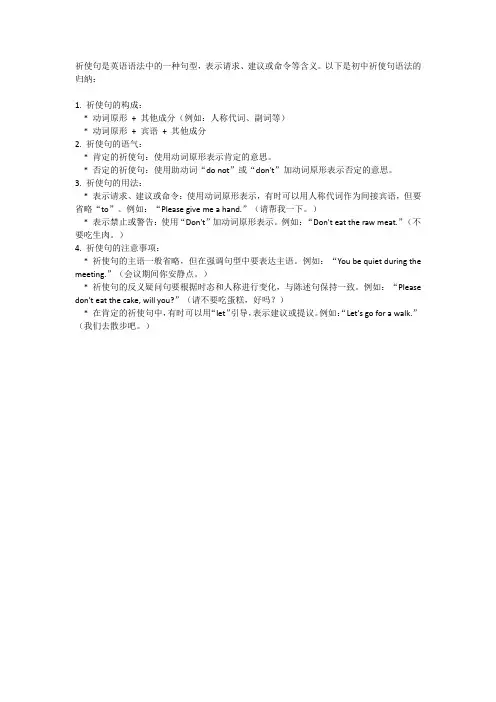
祈使句是英语语法中的一种句型,表示请求、建议或命令等含义。
以下是初中祈使句语法的归纳:
1. 祈使句的构成:
* 动词原形+ 其他成分(例如:人称代词、副词等)
* 动词原形+ 宾语+ 其他成分
2. 祈使句的语气:
* 肯定的祈使句:使用动词原形表示肯定的意思。
* 否定的祈使句:使用助动词“do not”或“don't”加动词原形表示否定的意思。
3. 祈使句的用法:
* 表示请求、建议或命令:使用动词原形表示,有时可以用人称代词作为间接宾语,但要省略“to”。
例如:“Please give me a hand.”(请帮我一下。
)
* 表示禁止或警告:使用“Don't”加动词原形表示。
例如:“Don't eat the raw meat.”(不要吃生肉。
)
4. 祈使句的注意事项:
* 祈使句的主语一般省略,但在强调句型中要表达主语。
例如:“You be quiet during the meeting.”(会议期间你安静点。
)
* 祈使句的反义疑问句要根据时态和人称进行变化,与陈述句保持一致。
例如:“Please don't eat the cake, will you?”(请不要吃蛋糕,好吗?)
* 在肯定的祈使句中,有时可以用“let”引导,表示建议或提议。
例如:“Let's go for a walk.”(我们去散步吧。
)。
英语语法之祈使句表示要求或命令的句子是祈使句。
祈使句一样用降调,为使祈使句听起来比较婉转,可用低音调,祈使句句末用句号或感叹号。
下面是作者给大家带来的英语语法之祈使句,欢迎大家浏览参考,我们一起来看看吧!初中英语知识点:祈使句祈使句的含义:1. 表要求Pass me the sugar, please. 请把糖递给我。
2. 表命令Put up your hands. 举手。
Fill in this form. 把这个表填好。
3. 表建议Let’s have dinner together. 我们共进晚餐吧。
4. 表邀请Come in and have a seat. 进来请坐。
Help yourself to some fruits. 请吃水果。
5. 表警告Hurry up or you will be late.抓紧点,不然你要迟到了。
Do that again and you”ll be in trouble.要是再干那事,你会有麻烦的。
6. 表制止Don’t touch the exhibits.不要触摸展品。
Don’t play on the ro ad.不要在马路上玩耍。
7. 表嘱咐Be sure to get there before nine. 务必在九点前赶到那里。
Take care not to catch cold. 谨慎别着凉了。
8. 表号令Workers of all countries, unite! 全世界工人阶级联合起来!9. 表庆祝Have a good trip. 祝你旅途愉快。
祈使句句末用句号或感叹号。
祈使句有两种类型:含有第二人称和带有第一、三人称主语的祈使句。
每种类型又有肯定情势和否定情势。
用don’t否定时,只能用其缩略情势。
例如:Welcome to Beijing Park.Walk about three blocks.Don’t mention it.无动词祈使句在要求、命令和口号中,常用无动词祈使句,它实际上是省略了动词,从而使语句更简洁或有力。
中考英语语法---祈使句知识点英语祈使句知识点祈使句定义定义:祈使句表示请求、命令、建议等等。
谓语动词一律用原形。
句子中通常省略主语(you),句末用惊叹号或者句号,用降调。
1. 肯定的祈使句1)以系动词be开头的祈使句,这种祈使句的常用结构:be+形容词/ 名词Be quiet / quick! 安静些!/快点!Be a good student! 做个好学生!2)以实义动词开头的祈使句,这种祈使句的常用结构为:动词原形+宾语(+其他)。
(省略主语)Come in, please!请进!Please open your books!请翻开书!有时,为了加强语气,可以在动词之前加doDo sit down. 务必请坐。
Do study hard. 一定要努力学习。
3) let型(Let+宾语+动词原形+其他)Let him do it by himself. 让他自己做。
Let me help you. 让我帮助你。
Let’s go to the park. 让我们去公园。
2. 否定的祈使句1)be型(Don’t be +其他成分(形容词、名词或介词短语))Don’t be careless! 别粗心。
Never be late again next time! 下次不要再迟到。
注意:①在这种句型中,be不能省略②否定副词not不可置于be之后2)do型(Don’t +动词原形+其他)Don’t believe him! 别相信他!Don’t worry! 别担心!Never do it again! 不要再这样做了!3)Let引起的祈使句有两种否定形式a. Let+宾语+not+动词原形+其他Let her not do that. 别让她那样做。
Let’s not think about it. It’s only a waste of time.咱们别考虑了。
只是浪费时间。
b. Don’t+ let+宾语+动词原形+其他Don’t let Jim do that. 别让Jim那样做。
英语语法祈使句知识点 祈使句是表⽰请求、命令、劝告、祝愿或建议的句⼦。
祈使句的主语⼀般为第⼆⼈称,但往往省去不⽤。
同学们在学习祈使句时应注意以下⼏点: ⼀、祈使句谓语⽤何动词形式 英语祈使句的谓语总是⽤动词原形。
如: Be quiet! 别说话! Come earlier next time. 下次早点来。
Have a good time. 愿你玩得痛快。
Go and tell her. 去告诉她吧。
注:有时为了加强语⽓,可在动词前加do。
如: Do be careful. 务请⼩⼼。
Do come on time. 务必请准时来。
⼆、肯定祈使句如何变成否定祈使句 祈使句否定式的构成⽅法是在动词原形前加don’t: Don’t be late. 不要迟到。
Don’t speak so loud. 别这么⼤声说话。
Don’t walk on the grass. 不要在草坪上⾛。
Don’t lose the key. 别把钥匙丢了。
Don’t come unless I telephone. 除⾮我打电话,否则你别来。
三、与please连⽤以使语⽓委婉 为使语⽓委婉,通常将祈使句与please连⽤。
Please可⽤于祈使句的.句⾸(其后通常不⽤逗号)或句末(其前通常⽤逗号)。
如: Please don’t get angry. 请不要⽣⽓。
Please drive more slowly. 请开得慢⼀点。
Please cut me a piece of cake. 请给我切⼀块蛋糕。
Please try to be quiet. 请设法保持安静。
Please repeat what you’ve just said. 请把你刚才说的话重复⼀遍。
四、关于以let开头的祈使句 Let’s eat out tonight. 我们今晚出去吃饭吧。
Let me have a try. 我来试⼀试。
初中英语――祈使句祈使句指的是表示命令、请求、建议或劝告的句子。
其主语you常省略,谓语动词用原形,句末用感叹号或句号,读降调。
1. 肯定的祈使句(1)动词原形+其他Stand up, please. = Please stand up. 请起立。
(2)Be + adj.Be careful! = Look out! = Take care! 小心/ 当心!(3)Let's + 动词原形Let’s go to school together. 咱们一起上学去吧。
2. 否定的祈使句(1) Don't + 动词原形Don't stand up. 别站起来。
Don't be careless. 别粗心。
Don't let them play with fire. 别让他们玩火。
(2)Let's ( let sb ) + not + 动词原形Let's not say anything about it. 对于这件事,咱们什么也别说。
Let them not play with fire. 别让他们玩火。
3.祈使句的反意疑问句(1) 肯定祈使句的反意疑问句反问部分用will you 或won't you。
Please open the door, will/ won’t you? 请把门打开,好吗(2) 否定祈使句的反意疑问句反问部分只用will you。
Don't be late again, will you? 别再迟到了,行不行(3) 以let's开头的祈使句反意疑问句反问部分用shall we。
Let's turn on the TV, shall we? 我们把电视打开,好吗<特别注意> 只有以let's开头的祈使句的反意疑问句的反问部分才用shall we,而let us 开头的祈使句的反意疑问句的反问部分应为will you或won't you.如:Let us stay here, will/ won't you? 请(你)让我们留在这好吗语法练兵场单项选择1. The TV is too loud. Please________.A. turn it downB. to turn it downC. turn down itD. to turn down it2. _______ late again, Bill!A. Don't to beB. Don't beC. Not beD. Be not3. _______ cross the road until the traffic lights turn green.A. NotB. Won'tC. Doesn'tD. Don't4. Please help me carry it, ______?A. will IB. will youC. shall ID. shall we5. Don't make so much noise, ______?A. will youB. won't youC. shall weD. do you6. Do you know the girl ______under the tree?A. standB. to standC. standingD. stood7. Kate, _______ your homework here tomorrow.A. bringB. bringsC. to bringD. bringing8. ________ me the truth, or I'll be angry.A. TellingB. To tellC. ToldD. Tell9. I've kept the dog _______Maomao for a long time.A. NameB. namedC. namingD. to name10. Don't you know that _______ is good for our health?A. swimB. swimmingC. swamD. swims?句型转换11. Will you please read it again more slowly? (改为祈使句)___ read __ __ it __ again more slowly, please.12. If you don't listen to me, I'll go. (改为同义句)_____ _____ me, or I’ll go.13. Let's watch the sports games. (改为反意疑问句)Let's watch the sports games, _____ _____?14. The teachers often tell the students not to be careless. (改为祈使句)_____ _____careless, please.15. Please sit next to Nancy. (改为否定句)_____ _____ next to Nancy.16. Don't forget to turn off the lights, please. (改为反意疑问句)Don't forget to turn off the lights, _____ _____?17. If you move, you'll die. (改为同义句)_____ _____, or you'll die.18. Come to my house tomorrow. (改为反意疑问句)Come to my house tomorrow, _____ _____?19. 这是一个坏了的被子。
初中英语语法祈使句3篇初中英语语法祈使句祈使句是一种特殊的句子类型,用于表达命令、请求、建议或警告等意思。
在初中英语学习中,了解和正确运用祈使句的语法规则非常重要。
本文将分为三个部分,分别介绍祈使句的构成、常见的祈使句规则及其用法、以及几个与祈使句相关的注意事项。
一、祈使句的构成祈使句是由一个动词原形构成的句子,通常只包含一个谓语动词,主语一般省略。
因此,祈使句的基本结构为:动词原形+其他。
二、常见的祈使句规则及其用法1. 一般祈使句一般祈使句用于表示命令、请求或建议等。
其基本形式为:动词原形+其他。
例句:- Stop talking!(停止说话!)- Please clean your room.(请打扫你的房间。
)- Be careful!(小心!)2. 以动词原形开始的祈使句有些以动词原形开始的祈使句,在句子最前面加上don't构成否定形式,用于表示禁止或警告。
例句:- Don't touch the hot stove.(不要碰热炉子。
)- Don't eat too much candy.(不要吃太多糖果。
)3. 以let's开头的祈使句以let's开头的祈使句用于提出建议或邀请,表示一起做某事。
例句:- Let's go for a walk.(咱们出去散散步吧。
)- Let's have lunch together.(咱们一起吃午饭吧。
)4. 使用情态动词的祈使句在祈使句中,我们可以使用情态动词来表示对某种特定行为的劝告或要求。
例句:- Should you need any help, feel free to ask.(如果你需要帮助,随时提问。
)- May I borrow your pen, please?(请允许我借用你的铅笔。
)三、注意事项1. 对称动词使用当祈使句的主语是第二人称代词(如you)或第一人称复数形式(如we)时,我们可以使用对称动词。
英语祈使句的结构在英语语法中,祈使句(Imperative Sentences)是用来表示命令、请求、建议或者劝告的一种句子形式。
祈使句通常使用动词原形来表达,而且一般省略主语。
本文将介绍英语祈使句的结构和使用。
英语祈使句的基本结构包含两个主要部分:动词原形和其他补充部分(如果有的话)。
动词原形是祈使句的核心部分,表示所应该做的行动。
其他补充部分可能包括副词、代词或者其他修饰词,以提供更多的信息或者限制。
首先,我们来看一个简单的例子:“Open the window.”(打开窗户)。
在这个句子中,“Open”是动词原形,表示所应该做的动作;“the window”是补充部分,指示动作的对象。
这个例子中省略了主语,但通常情况下,主语可以是你(常用于面对某个人的命令),也可以是人们(用于面对多个人的命令)。
此外,英语祈使句也可以使用否定形式。
一般而言,否定祈使句使用“don't”加上动词原形来表示。
例如:“Don't be late.”(不要迟到)。
这个例子中,“Don't”表示否定,后跟动词原形“be late”,表示所不应该做的行为。
除了基本结构外,英语祈使句还可以根据具体的语境和目的来进行修饰和扩展。
下面是一些常见的修饰和扩展方式:1. 使用副词:祈使句可以使用副词来修饰动作的方式、时间或者频率。
例如:“Please speak slowly.”(请慢慢说)和“Always remember to wear a seatbelt.”(记得始终系好安全带)。
2. 使用代词:祈使句可以使用代词来指示动作的对象。
常见的代词有“You”(你),“Everyone”(每个人),以及“Nobody”(没有人)。
例如:“You give it a try.”(你试试看)和“Everybody be quiet.”(大家安静)。
3. 使用其他修饰词:祈使句还可以使用其他修饰词来提供更多的信息或者限制。